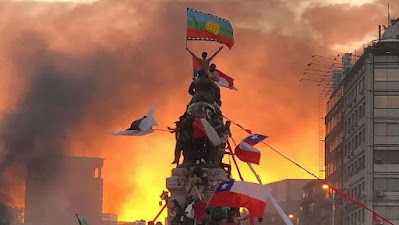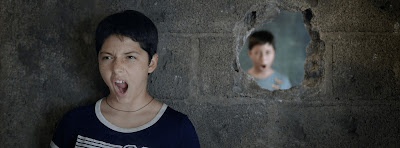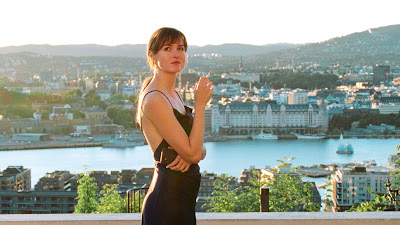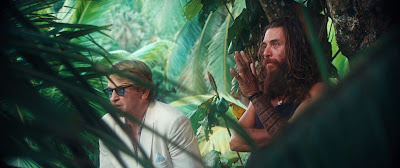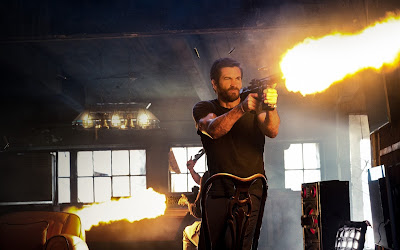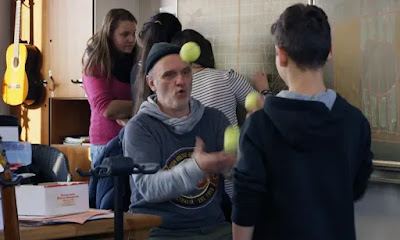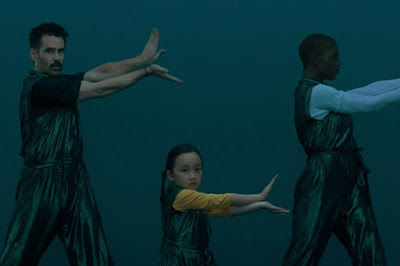25 – My Imaginary Country (Patricio Guzmán)
Patricio Guzmán has spent six decades documenting political upheaval in Chile, with each new film feeling like another thread woven into a single sprawling tapestry. My Imaginary Country begins in October 2019, when a thirty pesos increase on the subway fare became "the spark that set the whole country on fire." The social protests that followed saw millions risking violence and repression to fight for nothing less than a rewriting of the constitution, and in this struggle Guzmán sees the possibility of finally fulfilling the legacy of Salvador Allende. Guzmán's filmmaking is as graceful as ever, creating a thoughtful and poetic narrative while also putting us in the centre of the maelstrom. There's something very moving about the 81-year-old Guzmán finally seeing a new generation take back the soul of his country, and My Imaginary Country is a potent reminder that real change is possible.
24 – Winter Boy (Christophe Honoré)
Christophe Honoré's latest film captures something specific and true about the volatile and unpredictable nature of grief, as its teenage protagonist negotiates the aftermath of his father's sudden death. Honoré has a loose, intimate style, and when the emotions suddenly burst through for his characters they do so in a way that feels raw and authentic. 17-year-old Lucas (superbly played by Paul Kirchner) can come off as a frustrating and obnoxious figure, but he's also capable of great thoughtfulness and tenderness. He's a fully rounded and complex individual, and Honoré doesn't try to simplify any of the characters or their relationships in this film down to one easily digestible thing. Exceptional work from Juliette Binoche, Vincent Lacoste and Erwan Kepoa Falé in supporting work, and the tactic of having characters reveal their unspoken thoughts to the camera pays off beautifully towards the end.
Strawberry Mansion is set in a dystopian future where our dreams are liable to taxation and subliminal advertising, but this is surely one of the most playful and eccentric dystopian visions ever presented on screen. Much of the film is set in those dreamscapes, and the filmmakers embrace the warped logic and elastic sense of time in dreams to put together a series of bizarre (and often hilarious) individual scenes that add up to a surprisingly epic and poignant adventure. At times the film made me think of filmmakers like Lynch, Gondry, Maddin and Hertzfeldt, and the cheap, homemade quality of the art direction and the visual effects employed here adds to the film's enormous charm. I also loved the use of jerky stop-motion animation in some sequences, and Tyler Davis's digital cinematography being transferred to 16mm gives the whole film a lush visual texture. It's a wonderfully imaginative and funny picture, executed with so much skill and resourcefulness.
22 – Armageddon Time (James Gray)
It's good to have James Gray back on home turf. Watching Anthony Hopkins and his grandson launch a homemade rocket in the park is a thousand times more affecting than anything in Ad Astra. Armageddon Time feels deeply personal, full of moments that have surely been drawn from the director's childhood memories (or François Truffaut's), and many of the dynamics between the characters are acutely observed. But beyond being a mere nostalgia piece, Gray uses this story to explore difficult questions of race and class, and the complicity that he and his Jewish family share as they made certain choices to assimilate and prosper at the start of Reagan's 80s. These kinds of choices were clearly unavailable to black kids like Johnny, a character who never quite convinces as anything more than a convenient plot device, and would barely exist at all if it weren't for the startlingly mature and charismatic performance given by Jaylin Webb. Gray gets terrific work from all of his actors, particularly Hopkins, and his film is beautifully crafted, creating an evocative sense of a particular time and placed.
21 – Ennio (Giuseppe Tornatore)
Giuseppe Tornatore's tribute to his great friend and collaborator is conventionally structured with its use of talking head and archive clips (and some of the soundbites here feel disposable), but generally the contributions are thoughtful and illuminating, particularly the Italian musicians who knew him in his pre-cinema career. It's fascinating to learn more about his innovative work as an arranger of 1960s pop songs, and how his film work denied him the respect of his fellow classical composers for so long, with one even sending him a letter of apology after watching Once Upon a Time in America. Morricone himself is a wonderful interviewee – humble, charming and revealing – and it's a privilege to hear him talk about how he constructed his extraordinary scores. Above all else, this documentary is simply an astonishing compendium of some of the greatest music ever written The range, the ambition, the imagination and the emotional force of Ennio Morricone's work is simply awe-inspiring. I had hairs standing up on the back of my neck and tears filling my eyes throughout much of this film. How lucky we are to have been blessed by his genius.
20 – Avatar: The Way of Water (James Cameron)
I loved Avatar when it came out in 2009, but I never had any burning desire for a sequel, and I'm one of those people who spent plenty of time in the intervening years complaining that one of our great action filmmakers was devoting decades of his career to this project alone. Having now watched what Cameron has been obsessing over, I have to hold up my hands: the man simply does not miss. There's so much in this movie that shouldn't work – it's a thin plot stretched out over three hours, the dialogue is rife with clichés and cheese, and so many of Cameron's ideas are incredibly goofy – but he puts it across with such conviction and sincerity I couldn't help getting pulled along by the current. Visually, it's like nothing else, and the water sequences – where Cameron frequently stalls the narrative completely just to drift around – are truly spellbinding. Cameron remains the king of the big third act, and by the time the action-packed final hour of this one rolled around I was fully invested in it. Will the scope of Cameron's vision sustain three more sequels? I don't know, but I'm hesitant to bet against him.
19 – Vortex (Gaspar Noé)
Noé begins Vortex with a dedication “To all those whose brains will decompose before their hearts,” and his film depicts that fate with terrifying authenticity. He has never before filmed his characters with such patience and restraint, allowing scenes to unfold in long, naturalistic takes that immerse us in the mundane reality of this elderly couple's lives. The screen is split in two to follow Dario Argento and Françoise Lebrun independently, with Lebrun often looking lost and fearful as she tries to navigate through the fog of dementia, and Argento increasingly filled with anxiety at his wife's deterioration. The performances from both actors - and Alex Lutz, who plays their son - are exceptional. Noé tracks their decline in painful detail and the closing scenes lay out the end of life in a clinical way: death, funeral arrangements, a lifetime of objects boxed away, an apartment cleansed of memories. Noé has made a number of films that are hard to watch, but Vortex is his most compassionate and haunting work.
18 – Prayers for the Stolen (Tatiana Huezo)
Prayers for the Stolen looks at the grim reality faced by women trying to raise their daughters in a Cartel-run Mexican village. The girls are given boyish haircuts and taught to hide whenever the black SUVs are spotted in the vicinity. Their mothers know the risk of abduction increases the closer they get to womanhood, and they walk a very fine line of trying to prepare their girls while protecting their innocence and sparing them the true horror of their possible fates. The casting of the 8 year-old girls and their teenage versions is brilliant (at first I wondered if the director had taken a Linklater-style filming break!), and Huezo superbly captures the moments of casual playfulness and intimacy that the three leads share, which the threat of violence so suddenly intrudes on. Huezo has a keen sense of how to be suggestive and when to withhold, and the film's patient pacing pays off with how immersed I felt in this world by the time we reached the wrenching final fifteen minutes.
17 – Rimini (Ulrich Seidl)
With its over-the-hill protagonist sporting a blonde ponytail and trying to reconnect with his daughter, Rimini occasionally gives the impression that Ulrich Seidl has decided to remake Darren Aronofsky's The Wrestler. This is every inch an Ulrich Seidl film though, with its bleak landscape and kitschy interiors, symmetrical compositions, frank sex scenes, seedy atmosphere and mordant sense of humour. Rimini is built around a brilliant lead character. Richie Bravo (the astounding Michael Thomas) is a fading lounge singer who performs in wintry and depressing seaside resorts, charming his small but devoted audience of elderly women, and occasionally servicing them for a bit of extra cash in their hotel rooms. Richie also spends time with his dementia-afflicted father (Hans-Michael Rehberg, who died in 2017), and his daughter (Tessa Göttlicher), who has turned up demanding compensation for Richie's years of absence. The daughter is the most one-dimensional character in the film, and the scenes between these two characters could have used some development, but this is a superbly realised and very entertaining film, boasting one of the best lead performances you'll see anywhere this year.
16 – The Eternal Daughter (Joanna Hogg)
This haunting film almost feels like an epilogue to The Souvenir, with the now middle-aged filmmaker wrestling with the ethics and responsibility of making a film about her mother. Hogg places The Eternal Daughter firmly in the tradition of the classic English ghost story, creating an unsettling atmosphere in these creaking corridors and mist-shrouded grounds (all beautifully shot by Ed Rutherford), but there is no horrific revelation to anticipate here. This is a quiet study of unresolved grief, memories and strained family bonds. Both sides of the mother-daughter relationship are perfectly played by Tilda Swinton, and given the way Hogg creates her films through improvisations with her actors, it's an astonishing feat by Swinton to pull off these extraordinary dialogue scenes single-handed. Although the film is primarily about this relationship, Swinton does have support from the touching Joseph Mydell and the hilariously insolent Carly-Sophia Davies. The Eternal Daughter felt a little slight as I watched it, but it has cast an undeniable spell over me and has remained in my thoughts in the subsequent months.
15 – Happening (Audrey Diwan)
Like 4 Months, 3 Weeks and 2 Days, this is the story of an illegal abortion that develops a gut-wrenching sense of urgency. The simple tactic of ticking the weeks off with onscreen captions ramps up the tension, as the point of no return for this young woman rapidly approaches, and the film's final third is really hard to watch. Anamaria Vartolomei's fiery performance makes us feel all of Anne's anxiety and desperation and the film evokes a potent atmosphere of fear when the subject is raised, as even assisting with an abortion in 1960s France could land a person in jail. There's a superb steely cameo from Anna Mouglalis as a backstreet abortionist too. Happening is tough and sometimes shocking in its frankness, but never gratuitous or sensationalised, and Diwan's handling of the material is exceptionally confident and intelligent throughout. It's a hugely impressive piece of work.
14 – The Worst Person in the World (Joachim Trier)
A vivid and perceptive film about time passing as people try to figure out what kind of life they're meant to be living. The story is structured in twelve chapters, which proves to be a perfect match for Trier's style; he and Eskil Vogt are so good at crafting these moments that feel specific and true, and this film is full of them. The filmmaking is dynamic and imaginative, with the spry romantic energy of the first half gradually giving way to something more patient and reflective. Renate Reinsve is a marvel, offering us a series of wonderful silent close-ups where the full range of Julie's mixed emotions play across her face, and Anders Danielsen Lie's prickly performance develops into something deeply moving towards the end. Even when The Worst Person in the World feels like it's covering familiar territory, it's so funny, rich, inventive and (thanks to Kasper Tuxen's exceptional 35mm work) beautiful to watch.
13 – Top Gun: Maverick (Joseph Kosinski)
Like the recent Mission: Impossible films, Top Gun: Maverick is the product of Tom Cruise's maniacal obsession with bringing a sense of verisimilitude and real physical stakes back to Hollywood blockbuster filmmaking. The flying sequences – with the pilots performing absurd manoeuvres just a few hundred feet off the ground – are spellbinding, with clean, classical editing by Eddie Hamilton and some beautiful images captured by Claudio Miranda. Joseph Kosinski pays homage to Tony Scott's eye for sunsets, but his direction is generally more grounded and unflashy, and his tight pacing of the story is perfect. The film hits its expected narrative beats in ways that feel sincere and authentic, often to surprisingly moving effect (the Val Kilmer cameo is lovely), and performances across the board are solid. Cruise is in his element, of course, delivering the kind of intense and magnetic movie star performance that only he can give. “The future is coming, and you’re not in it” Cruise is told early in this film. "Maybe," he responds, "but not today."
12 – Pacifiction (Albert Serra)
It feels like something is constantly simmering in Pacifiction - perhaps even the end of the world - although Serra never brings anything to the boil. After almost three enigmatic and languorously paced hours, it can feel like an anticlimactic tease, but I was so captivated by the world that Serra creates, I wasn't too dismayed by the lack of a payoff. Through his detached observation of the dynamics between characters, Serra suggests political gamesmanship, colonial unrest and a sinister atmosphere of suspicion and paranoia. His widescreen compositions are striking and haunting, and the way Serra's digital camera captured the island's peach skies and dark seas reminded me of Mann's Miami Vice. Excellent work from first-time actress Pahoa Mahagafanau, but as the apparently benevolent and slyly manipulative De Roller, Benoît Magimel is unbelievably good.
11 – The Quiet Girl (Colm Bairéad)
Colm Bairéad's Irish-language adaptation of Claire Keegan's Foster feels like a perfect short story. It's a small film made made with such specificity, and such a keen attention to character and atmosphere, it's grows into something completely captivating. Bairéad shows real patience and intelligence in his direction, leaving plenty of room for potent silences and allowing these characters to develop and reveal themselves to us gradually. The central performances are all finely judged, but I especially loved Andrew Bennett, whose stiff, monosyllabic awkwardness around Cáit grows touchingly into a real affection, with his smallest gestures carrying great weight. The simple act of silently leaving a Kimberley biscuit on the kitchen table is profoundly moving. It is a lovely and compassionate piece of filmmaking.
I never saw Michael Bay's 2019 film 6 Underground, as it bypassed cinemas completely and went straight to Netflix, but Ambulance was a rousing return to the big screen for this grand orchestrator of carnage. He throws all of his favourite directorial tools at this one – sweaty close-ups, swirling hero shots, a cacophonous sound mix, frantic editing, weird comic asides, corny sentimentality – and it was a thrill to have my senses pummelled. Bay tries to shoot this extended car chase from every conceivable angle, making particularly good use of vertiginous drone shots, and he successfully sustains the tension even as he ramps up the ridiculous action and piles on complications. I can't think of many filmmakers who would try to pull off the gory, silly, intense surgery scene that he puts in the middle of the chase. At the centre of the storm, the gleefully unhinged Gyllenhaal, the conflicted Abdul-Mateen II and the steely Gonzalez are a charismatic and compelling trio to be trapped with.
9 – Aftersun (Charlotte Wells)
A remarkably assured debut feature that feels so specific and authentic in the way it presents its protagonist's memories. Charlotte Wells allows her story to unfold with such ease, through a collection of delicate moments that seem to emerge in a spontaneous and unforced way. I particularly love the scenes where she captures Sophie hovering around and observing on the edge of the teenage world, or the way she quickly undercuts the bright and breezy holiday atmosphere with brief but piercing insights into Calum's private pain. The editing is exceptional and the shot selection is full of unexpected choices that always feels intuitive and right. The wonderful chemistry between Mescal and Corio is the heart and soul of the film, with the two actors capturing the nuances of this relationship in a way that is so moving.
8 – RRR (S.S. Rajamouli)
This was one of the most exhilarating nights I had at the movies in 2022; I can't remember the last time I heard an audience break out in spontaneous applause multiple times during a screening, and RRR earns every bit of that acclaim. Rajamouli goes for broke with his elaborate and physics-defying action sequences, where everything from wild animals to motorbikes can be picked up and used as a weapon, and while he never quite tops the assault on the British embassy that ends Part One (just before the "inteRRRval"), he comes pretty close. These over-the-top sequences are pitched at a cartoonish level, but Rajamouli and his lead actors keep the maximalist spectacle rooted in an emotional core, and it's impossible not to be mesmerised by the panache in the filmmaking, with Rajamouli displaying such wit and exuberance in his composition and editing of the major set-pieces. RRR is a real feast of a picture, and over the course of three hours there's barely a dull moment.
7 – Decision to Leave (Park Chan-wook)
“Killing is like smoking. Only the first time is hard.” This incredibly stylish Hitchcockian mystery really bowled me over. Park's formidable craftsmanship is firing on all cylinders here, but what really elevates Decision to Leave is the disarming romance and eroticism of its central relationship, which ultimately evolves into something tragic. Park Hae-il brilliantly expresses the gradually consuming growth of Hae-joon's obsession, while Tang Wei is entirely captivating as she carefully sustains Seo-rae's ambiguity. Park lays out a complicated plot that's packed with flashbacks and delayed revelations, and at times I struggled to get my bearings, but it's a pleasure to be pulled back and forth by a director who is in such command of the tools at his disposal. Every scene in Decision to Leave is staged with wit and invention, elegance and precision. A dazzling movie.
6 – Mr Bachmann and His Class (Maria Speth)
This 217-minute observational documentary about an inspiring schoolteacher is almost the dictionary definition of My Kind of Thing. The children in Mr Bachmann's class are the sons and daughters of immigrants, mostly from Turkey and Eastern Europe, and they have varying degrees of German-language skills. Mr Bachmann teaches them the usual maths and English, but most of his classes consist of singing songs, telling stories and discussing a variety of issues with his students, in the hope of helping them grow in confidence and empathy. He demands respect and attentiveness, but he is not a disciplinarian, and it's clear that he and his class adore each other (and Mrs Bal, a fellow teacher we spend some time with). Speth's pacing is patient but never slack, and the film justifies its epic running time by allowing us to witness the individual personalities and complexities of these children emerging, meaning I was fully invested in their journey by the end of the film.
5 – All The Beauty And The Bloodshed (Laura Poitras)
This film is the story of so many destroyed lives, from the family tragedy that shaped Nan Goldin to the friends she lost to AIDS, and the opioid addiction that has killed so many and almost claimed her life. Goldin's campaign to hold the Sackler family accountable for America's devastating opioid epidemic gives this documentary its narrative drive, but Poitras brilliantly weaves the artist's own remarkable life story into this central thread, showing how her experiences informed her art and how her astonishingly evocative and beautiful photographs illuminated the society she lived in. The personal aspect of All The Beauty And The Bloodshed is revealing and poignant, while the sense of waste and injustice in their ongoing David-and-Goliath battle with the Sacklers is beyond enraging. A beautifully crafted and deeply moving portrait of an extraordinary artist.
4 – Onoda: 10,000 Nights in the Jungle (Arthur Harari)
Werner Herzog published a book about Hiroo Onoda this year, and it was hard to avoid thinking of him as I watched this film. Onoda was one of the Japanese soldiers who kept on fighting in the jungle long after World War II had ended, finally being relieved of his post in 1974. His life gets a suitably epic presentation in Arthur Harari's magnificent film, which takes its time and tells his story over a leisurely but entirely absorbing three hours. The pacing allows us to experience the characters' sense of isolation and gradual slide into loneliness and delusion, and Harari strikes a beautiful balance in his storytelling. The film is often tragic but there are some humorous moments too, and the relationship between Onoda and his closest companion Kozuka is very touching. Yuya Endo and Kanji Tsuda give equally spellbinding performances as the young and old Onoda, and Tom Harari's natural light cinematography is exceptional.
3 – After Yang (Kogonada)
After sitting on the shelf for more than a year, After Yang was finally picked up by Sky in the UK, which meant it barely got any time in cinemas before appearing on TV. This was a terrible shame, because it's an exquisitely crafted film and I'm so glad I had the opportunity to be immersed in its world in the cinema. Kogonada uses the breakdown of a family's android – or 'technosapien' – to explore different aspects of grief, memory and identity. He creates a futuristic society that feels effortlessly real, and his aesthetic control is absolute, composing beautiful frames that he stitches together with his imaginative, elliptical editing. The film has a haunting sense of stillness and loss. Colin Farrell is remarkable here, giving a subtle performance full of sadness and empathy (while also delivering a very amusing Werner Herzog impression). He plays a tea enthusiast who describes a cup of tea as having the whole world in it but also containing mystery, and that could be an apt description of After Yang.
2 – One Fine Morning (Mia Hansen-Løve)
Mia Hansen-Løve is one of the very best we have, particularly the way she captures characters in a state of flux and depicts the passage of time so effortlessly. One Fine Morning is a film about loss, with Sandra (Léa Seydoux) preparing to say goodbye to her father (Pascal Greggory) as he succumbs to a neurodegenerative disease. This drama plays out while Sandra is beginning a new relationship with the married Clément (Melvil Poupaud), and Hansen-Løve strikes a perfect balance between the contrasting emotions stirred up by these two narrative threads. As ever, the performances she gets from her actors feel fully lived-in and emotionally honest, and Marion Monnier's editing creates a measured rhythm that completely captivated me. The gorgeously textured 35mm cinematography by Denis Lenoir brilliantly evokes the changing seasons and the shifting moods. This is one of Hansen-Løve's finest films.
1 – Godland (Hlynur Pálmason)
This story of a 19th century Danish priest travelling to Iceland to set up a new church could not have been more up my street, and Pálmason directs with jaw-dropping ambition and confidence. The editing is sublime and the 35mm Academy Ratio cinematography is flawless, whether it's capturing a tight close-up or framing the characters against the extraordinary Icelandic landscapes. Winter Brothers and A White, White Day firmly established Pálmason as a talent to watch, but Godland feels like a huge leap forward. His vision is so bold and exacting here, and he tells his story in exactly the right way, brilliantly utilising time-lapse photography to denote the passage of time. There's a moment in the middle of the film when he segues to a new section of the film via a slow tracking shot, some volcano footage and a scene of two girls playing in the river, and it's such a disorienting and inspired piece of filmmaking it had me slack-jawed in amazement. Godland put me in mind of filmmakers such as Bergman, Herzog, Troell and von Stroheim among others. It's the kind of great film that instantly feels timeless.

